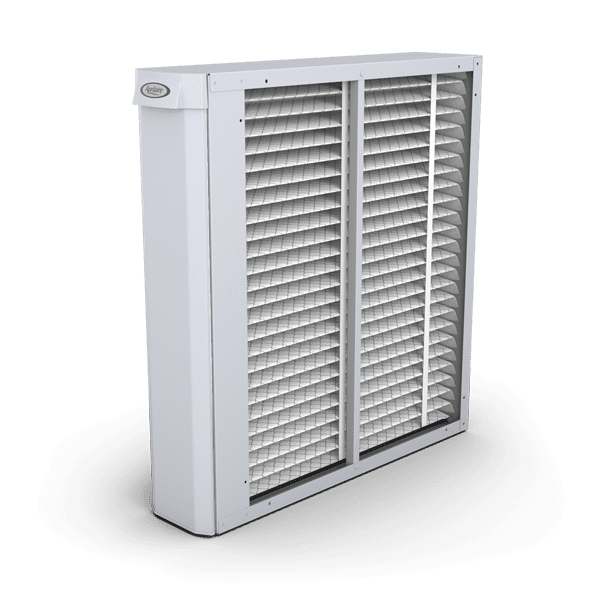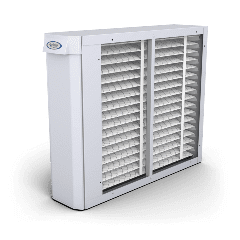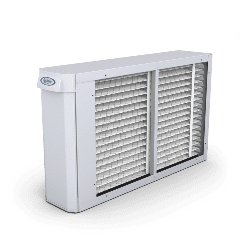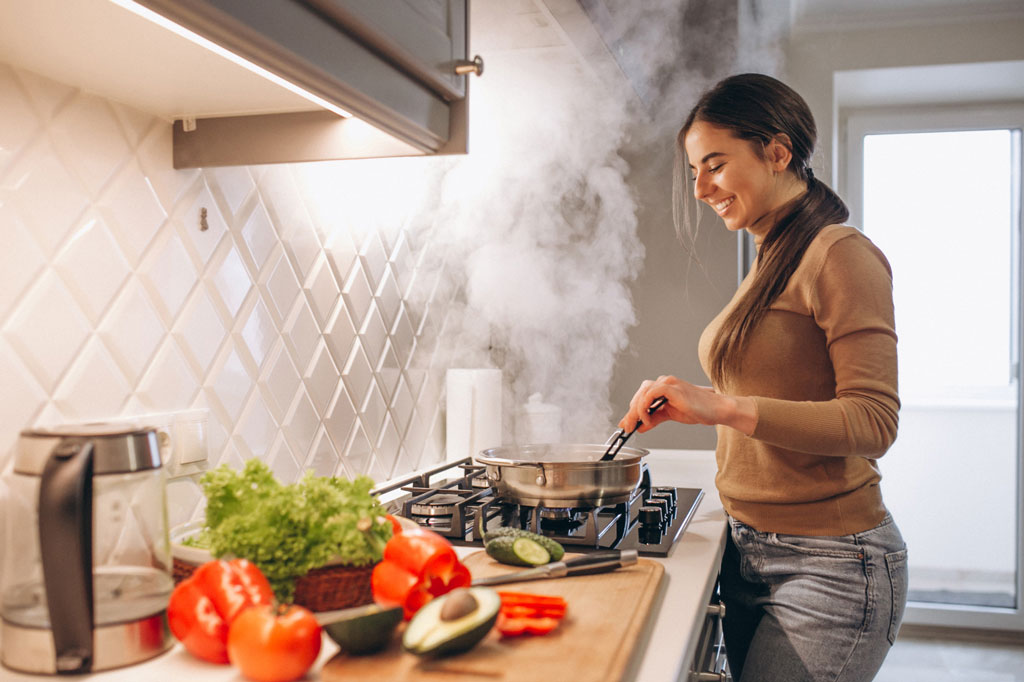
Media Air Filter Installation Services in Blacklick, OH
If you’re looking to improve the quality of air in your Central Ohio area home, a media air filter might be worth looking into. Air filtration is important, and media filters are especially helpful if you have pets in your home or you have things that could be jeopardizing your indoor air quality. In addition to increasing the lifespan of your HVAC systems and improving home’s indoor air quality, media filters help decrease the need for AC and furnace repairs.
If you’re looking to improve your home’s indoor air quality and make your air filters and HVAC systems last longer, we suggest giving us a call to discuss upgrading to a media air filter. The home comfort team at Blacklick Heating & Cooling would be happy to set you up with an air filter or air cleaner to use with your current HVAC system.
(614) 245-2572
What is a Media Air Cleaner?
When it comes to improving indoor air quality and protecting equipment, media air cleaners are an HVAC systems’ first line of defense. Media air cleaners do an excellent job at cleaning air and are considered a high quality air filter. As indicated, they trap all sorts of tiny invisible air particles and pollutants in the air. These pollutants include a host of things like dust, dirt, mold, pet dander, pollen, smoke and other particles. They are installed on a return duct line on your home comfort system and prevent particulates from entering your home. Media air cleaners last much longer than the standard one-inch air filter, which isn’t nearly as effective.
How Media Air Cleaners Work?
Media air cleaners are a cabinet which is positioned in the return air duct of the forced-air HVAC system. As the air passes through the HVAC system, the media air cleaner filters and traps airborne particles inside the filter media before they pass back into your indoor atmosphere.
Media Filters Vs. Standard Air Filters
Media air cleaners are a cabinet that is positioned in the return air duct of the forced-air HVAC system as the air passes through the HVAC system, the media air cleaner filters and traps airborne particles inside the filter media before they pass back into your indoor atmosphere.
The biggest difference between a media air cleaner and a standard or normal air filter in an HVAC system is the size. Standard or conventional air filters are usually only an inch thick. Media cleaners, however, are four to five inches thick. This thicker filtering allows more effective and superior air filtration.

Blacklick Heating & Cooling Presents:
A Homeowner's Guide to Media Air Filters
A Whole-House Media Air Cleaner traps and filters airborne pollutants and particles traveling through the HVAC’s air duct system, ensuring cleaner air. It is up to 85% more efficient at removing airborne particles than the usual 1-inch furnace filter. Check out a few of the media filters we carry:

Aprilaire 2210
Protect your family and your HVAC system with the Aprilaire 2210 Whole Home Air Purifier. The 2210 features a painted steel cabinet and comes with a 213 Healthy Home Air Filter, which removes most common allergens. This model has a nominal size of 20” x 25” – one of many sizes available for contractors to install into a wide variety of HVAC systems.

Aprilaire 2410
Protect your family and your HVAC system with the Aprilaire 2410 Whole Home Air Purifier. The 2410 features a painted steel cabinet and comes with a 413 Healthy Home Air Filter, which removes most common allergens. This model has a nominal size of 16” x 25” – one of many sizes available for contractors to install into a wide variety of HVAC systems.

Aprilaire 2516
Protect your family and your HVAC system with the Aprilaire 2516 Whole Home Air Purifier. The 2516 features a steel cabinet and comes with a 516 Allergy & Asthma Air Filter, which removes up to 99% of asthma triggers. This model has a nominal size of 31” x 28” – which is ideal for geothermal and other, larger HVAC systems.
Need a professional opinion? Call Blacklick Heating & Cooling now! (614) 245-2572.
Types of Air Filters for Your Blacklick, OH Home
Thanks to the minimum efficiency reporting value (MERV) rating, any filter with the same rating produces the same filtration quality. MERV measures a filter’s ability to capture small particles ranging from 0.3 microns to 10 microns. The higher the MERV rating, the more efficient and effective the filtration is. A low MERV rating, regardless of filter type, will provide lower filtration.
Here are 4 common types of air filters:
Media Filters
Media HVAC filters have more benefits than standard filters with high MERV ratings. Media filters offer the same level of filtration as a highly-rated MERV filter. They get the job done without affecting airflow or static pressure. These have a greater surface area to provide high-quality filtration while also preventing static pressure. They’re easy to maintain and great to combat bacteria and other particles. The filtered contaminants are sealed into it which prevents it from being pushed back into the home.
Pleated Air Filters
Pleated filters are made with cotton or polyester fabrics folded multiple times to create pleats. You can find these with a MERV rating between 5 and 13. They are effective at filtering dust along with other airborne pollutants. Like fiberglass filters, they don’t do a good job at filtering the air. They are less resistant to airflow.
High-Efficiency Particulate Air (HEPA) Filters
HEPA filters are those with a MERV rating of 16 or higher. Most homes don’t need this level of protection. They can remove at least 99.97% airborne particles, including mold and other allergens as tiny as 0.3 microns. They can remove the smallest particles, including cigarette smoke, bacteria, and other pollutants.
Fiberglass Filters
These are the most common types of air filters. Why? Because they are among the most affordable options on the market today. It’s made with strands of fiberglass. They are highly effective at protecting your HVAC system from dirt and debris. They aren’t a good option for cleaning the air. They can’t strain many airborne contaminants.
What is Indoor Air Quality?
When you own a home, comfort shouldn’t be your only consideration when it comes to HVAC equipment. When it comes to Heating, Ventilation and Air Conditioning, Indoor Air Quality is an extremely important issue as well, and an issue that all-too-often gets overlooked or neglected.
This is often the case because most homeowners feel that air pollution is strictly an outdoor problem. Nevertheless, studies indicate this is false. It turns out the air inside a lot of workplaces and homes is far more polluted and toxic than the air outside.
The EPA defines Indoor Air Quality as the quality of air inside a building or home and how it relates to the people inside the building or home. In general, Indoor Air Quality has a tangible and sometimes profoundly negative effect on our health in addition to our overall well-being, mood and energy levels.

Why is Indoor Air Quality Important?
With the majority of Americans spending more than 21 hours per day indoors, the air quality inside their homes has more of an effect on them than most people think. If the quality of air in a dwelling isn’t sufficient, it can have a negative impact on health and the home itself. Recent studies actually show the air in a lot of modern homes can be up to five times as toxic and polluted than the air outdoors, where nature has a wide range of ways of cleaning and purifying it and recycling it. All you have to do is consider how tightly insulated almost all modern homes and workplaces are intentionally made and it becomes obvious why HVAC experts and health officials advise homeowners to consider certain indoor air quality products to use in conjunction with their HVAC equipment.
Because modern dwellings are sealed air tight, if a home has indoor pollution it can get trapped inside and recirculated without proper filtration and ventilation. Then, on top of that, there can be issues with humidity, mildew and mold. More often than not, the use of a humidifier, dehumidifier or air purifier goes a long way when used alongside a heating or cooling system. Additionally, UV Lights and other air filtration products can benefit a homeowner tremendously.
Otherwise, if air quality is poor, short-term health implications can surface after a single exposure, or multiple times being exposed. Those short-term symptoms can irritate the nose, the eyes, the throat, and the skin. Or, it can cause fatigue, headaches, and dizziness. In the worst possible situations, officials say, long-term exposure to certain kinds of indoor air pollution can cause heart disease, respiratory illness and even cancer. Because of things like this, testing is essential.
WIth Indoor Air Quality being such a relevant health issue today, we at Blacklick Heating & Cooling advise homeowners to take certain measures to safeguard their health and the health of their loved ones against indoor air pollution. We also recommend keeping humidity in optimal range and regularly having preventative maintenance performed on your HVAC equipment.

Tips to Improve Indoor Air Quality for Blacklick, OH Homeowners
The quality of air in a dwelling is important for more than merely reasons of comfort. Clean Indoor Air Quality is also important for a happy and healthy life. Because the air we breathe is considered the essence of life, poor air quality has a major impact on your family’s well-being and health.
Here are 4 Tips to Improve Indoor Air Quality:
Upgrade Air Filters
Making sure your HVAC systems’ air filters get replaced on a regular basis is essential for not only indoor air quality, but also in order to get the most out of your system. Furnace filters need to be checked nearly every month during the winter. Additionally, upgrading to a HEPA filter will go a long way at cleaning out the air and improving air quality.
Keep Up with Cleaning
In addition to keeping rugs and carpets clean to improve air quality, including regular cleaning and vacuuming into your regular routine will go a long way in helping keep your home’s air quality optimal. Doing so prevents this stuff from building up.
Seasonal Maintenance
Staying current and consistent with the maintenance on your home comfort systems is essential for comfort and air quality. In fact, being proactive with all HVAC equipment enables it to run smoothly and do its job the way it was designed to do it. Being proactive always pays off in the long run.
Get an Air Purifier
Air purifiers not only improve your air quality, they also help your HVAC system capture free-floating dirt, dust, dander, pollen, and other allergens in your home. This helps your HVAC system make air filters last longer and reduce the stress from poor airflow. They can also kill bacteria, mold and viruses and remove strange odors from the air as well as chemical emissions. Learn more about the iWave-R Air Purifier and the Reme Halo.


